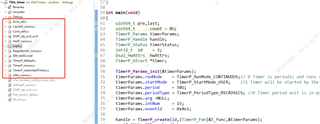Other Parts Discussed in Thread: TDA4VH
Tool/software:
Hi,
Platform:TDA4VH J784s4-evm C71x(1 GHz)
SDK:ti-processor-sdk-rtos-j784s4-evm-09_02_00_05
We want to use the timer function on the DSP. I see that the csl library has some related functions. When I looked at its test program(csl\test\dmTimerUt\dmTimer_funcTest.c), I found that some macro definitions are related to the mcu. I wonder if I can use these on DSP.
Thanks,




